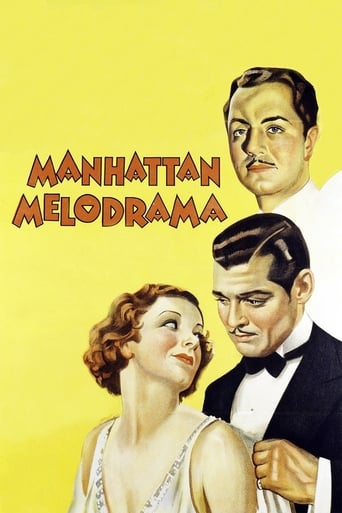richard-1787
This is a well-acted movie. Gable in particular is at his finest, as you can see most notably in his last scene, the prison cell, before he is led to the electric chair. The difference between his noble refusal to live imprisoned rather than to get it all over with as soon as possible and Powell's presentation of the governor as weak makes Gable look that much more charismatic.But what I found strange here was Myrna Loy's character's efforts to get her husband the governor to pardon Blackie. She knows that Blackie has killed a man - she doesn't seem to know that it was in self-defense. And yet she begs her husband to forget his scruples and pardon Blackie. That's hard to take, and would certainly make me suspect she is still in love with Blackie if I were in the governor's very uncomfortable shoes.The scene in the prison cell with Gable and Powell is wonderfully acted and beautifully photographed. The acting here is of a high level. But the moral issues in this movie are at best very problematic.
atlasmb
Myrna Loy, who was often paired with William Powell or Clark Gable, is paired with both in "Manhattan Melodrama". Gable plays Blackie--a gangster/casino owner with a sense of honor. Powell plays Jim--a childhood friend of Blackie, who, due to shared tragedies, becomes his spiritual brother, but finds success as a D.A. and politician.The film covers a lot of ground and the early scenes move at breakneck speed to bring the story to the adult lives of the main characters. Even then, the film feels like a condensed version of a film with more depth. Loy, as the love interest, holds her own and Powell is solid as the dutiful public servant, but Gable steals the show with his nuanced performance as anti-hero.The coincidences in this story stack up into a nifty pile of improbabilities, but it's a simple story at heart. Two "brothers" grow up on opposite sides of the law, but they still feel devotion to each other. Really, this is a love story. The most melodramatic parts are at the end of the film, when inescapable consequences allow for demonstrations of profound love.
MisterWhiplash
What a year Clark Gable, Myrna Loy and William Powell had in 1934, huh? They all act together in this film, Manhattan Melodrama, directed by WS Van Dyke and co-written by a young Joseph L. Makiewicz, and meanwhile Gabe earlier in the year was in It Happened One Night (ironically Loy was up for the role Colbert played), and later that year The Thin Man, which kicked off in a major way the star power of Powell and Loy together, came out and became a massive hit. All the films either won or got nominated for Oscars, and yet this film is kind of now on the B-side/double-bill. And to be sure, it's not as smashing or have the same re-watchability as those other films, which are considered among the best of 30's Hollywood (rightfully so, especially for the Thin Man). But Manhattan Melodrama shouldn't be discounted too quickly - at the least it's more than the simple footnote of Dillinger's pre-death-flick (I can relate - I would be there to see Myrna Loy, too).The film actually reminds me a bit of a later 30's flick, Angels with Dirty Faces - that film too was about two childhood friends, New Yorkers all the way, who go through paths in life that diverse, one to crime, the other to a more professional/helpful path. In this case, Powell and Gable play childhood friends who lose their parents in a boat accident, get raised by a new father, who also later on meets a sad fate. Powell becomes a lawyer, then a prosecutor for the state and, eventually, governor, while Gable is always the gambler, the gangster, the guy who just wants to have a good time. And Loy plays the girl who doesn't really come between them as stay friendly-if-neutral to Blackie while marrying Jim Wade - that, give the movie credit, would've been an easy direction for the melodrama as a love triangle, but it's more complicated, to be sure.The script gives its actors some good dramatic dialog to chew on, and among all the roles Gable probably gets to have the most fun while playing a not-too-good guy. It's a decent script once it gets its footing - the early childhood scenes are quite weepy, if shot and edited strikingly for fast, hard effect (and featuring a young Mickey Rooney!) - and it's a case where the actors elevate the material just a little more. This has star power to burn; the actors all click together, and no wonder with Loy, but Gable and Powell work very well and believably together too, with the conflicts that come up between the brothers - of law and order vs the gangster way, albeit this isn't as harsh a look as 'Angels' - and how the dynamics subtly change over time.You might not think there's any arc here, but there are, at the least with Powell's Jim Wade who gets on the rise as a law-and-order man but has this friend who could be his downfall. Loy is naturally beautiful without even having to try anything super-glamorous; she almost as a thing here like a young Diane Keaton, kind of sexy in a way that's hard to describe but plainly there in the sophistication of every movement and acting choice. And Gable... he's Gable - but watch for him in the last scene he has with Powell, he goes between a range of emotions that is just electrifying to watch (for me more believable than almost anything in Gone with the Wind).If Manhattan Melodrama is successful, and I think it is, it's because watching these actors - stars - in these roles, acting their asses off to make this more than believable, rather natural work, and van Dyke has some nice directorial choices. Conventional? Sure. But it's a moving little effort.
ackstasis
From what I can gather, two main social factors led to the popularity of the gangster genre in the 1930s. The first, and most obvious, was the prevalence of criminals like Al Capone and John Dillinger, who were glorified by the national media. The second was the Great Depression, and how it impacted the traditional notion of the "American dream." Families – regardless of character or social standing – were torn apart amid the economic collapse, and no doubt many ordinary citizens contemplated crime as the route to happiness.Films like 'Manhattan Melodrama (1934)' and 'Angels with Dirty Faces (1938)' place great emphasis on the thin line between "good" and "bad" characters, and often the central criminals are lamented as victims of circumstance. For example, James Cagney's Rocky Sullivan and Pat O'Brien's virtuous priest were separated by a matter of metres when the former is condemned to a life of crime. Circumstance, too, drives the fates of the characters in 'Manhattan Melodrama.' As children, both Jim Wade (William Powell) and Blackie Gallagher (Clark Gable) lose their parents in the burning of the steamship SS General Slocum, a true-life disaster caused by gross negligence that cost over 1000 lives. Each child responds to this injustice in their own way: Blackie rebels against the judicial system that betrayed him, whereas Jim enters law in a bid to reform it.Whereas Warner Bros. was responsible for most of the decade's gangster films, 'Manhattan Melodrama' was produced by M-G-M, and helmed by W.S. Van Dyke (director of the first four 'Thin Man' films), whose decidedly non-gritty aesthetic style at first seems at odds with the required mood. However, it would be misleading to compare the film with the likes of 'Little Caesar (1931)' and 'Scarface (1932).' Firstly, Hollywood was now working, for the first time, under the active supervision of the Production Code Administration. Also, the studio's intentions for the film were undoubtedly geared towards a higher-brow audience, further suggested by the unintimidating, woman-friendly title.Gable's "Blackie" Gallagher is not a paranoid hot-head like Tony Camonte or Rocky Sullivan, and, indeed, remains oddly passive throughout the film. When he does commit murders, it seems to be merely out of an obligation to genre conventions. Even when old friend Jim Wade dramatically demands his execution, Blackie looks on with a detached, amused smirk, doodling idly from the defendant's chair; the expected outburst of emotion never arrives. Instead, the story's central conflict unfolds entirely within the righteous Wade, who must choose between his personal and professional allegiances.'Manhattan Melodrama' has achieved some notoriety for being the film that killed John Dillinger, so to speak. The fugitive bank-robber was gunned down by FBI agents as he emerged from a screening at Chicago's Biograph Theatre on July 22, 1934 (clips from the film were recently featured in Michael Mann's 'Public Enemies (2009)'). These curious circumstances can't help but make one ponder what Dillinger had thought of 'Manhattan Melodrama.' Had he, like Blackie, accepted that his time was coming to an end? Did he welcome death over a lifetime of legal persecution? At the very least, he checked out having experienced a very fine addition to the genre.




